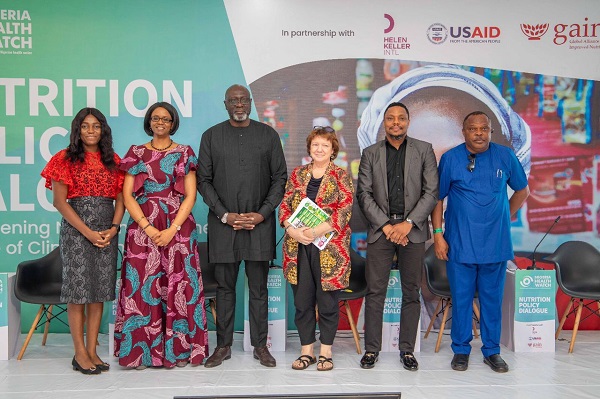
Stakeholders in the health sector have emphasised the need for a comprehensive approach to bolster nutrition outcomes in Nigeria, considering the challenges posed by climate change. The call was made during the 2023 Nutrition Policy Dialogue held in Abuja under the theme “Strengthening Nutrition Outcomes in the Face of Climate Change”.
The dialogue was organised by Nigeria Health Watch in collaboration with the Global Alliance for Improved Nutrition (GAIN), Action Against Hunger Nigeria (ACF), Save the Children International and Helen Keller International (HKI).
The director and head of prevention and control of micronutrient deficiency at the Federal Ministry of Health (FMOH), Mr. Uruakpa John highlighted the significant impacts of climate change on food systems, which, in turn, affect nutrition outcomes. He stressed the importance of climate-smart agriculture, which includes practices that enhance agricultural productivity, build resilience to climate change and reduce greenhouse gas emissions. Implementing such practices can ensure that food systems remain productive and provide nutritious foods despite the challenges posed by climate change.
John emphasised the critical nature of the 2023 dialogue, particularly in raising awareness about climate change. Given the already high levels of drought and malnutrition on the continent, immediate climate action is necessary to prevent the situation from worsening. He called for national commitments that prioritise healthy nutrition and the development of adaptation plans that include specific nutrition goals for women and children. Furthermore, he stressed the need to increase awareness of climate change among policymakers and stakeholders in Nigeria, while also strengthening the country’s institutional framework to enhance nutrition.
To ensure sustainable diets that are diverse, nutritious, and aligned with ecosystem functions and environmental conservation, John emphasised the importance of climate-smart agriculture, sustainable and resilient food systems, information dissemination, adequate funding and education.
During a panel session, the country director of GAIN, Dr. Michael Ojo emphasised the undeniable link between nutrition and climate change. He stressed the need to connect existing nutrition structures with climate change issues, citing the potential of public procurement to drive nutrition initiatives. Ojo suggested that diversifying food systems could ensure Nigerians have access to a variety of nutritious foods, including promoting the production and consumption of indigenous crops and traditional foods that are more resilient to climate change.
The chief of the water, sanitation, and hygiene (WASH) sector at United Nations International Children’s Emergency Fund (UNICEF), Dr. Jane Bevan highlighted the impact of climate change on water availability and quality, which directly affects nutrition outcomes. She emphasised the importance of improving water and sanitation infrastructure to ensure access to clean water, a crucial element for good nutrition. Bevan also stressed the significance of nutrition education in equipping Nigerians with knowledge and skills to make healthy food choices, even in the face of climate change. She pointed out the correlation between high levels of stunting and WASH issues, highlighting the need to promote sanitation practices to improve lives.
According to Bevan, Nigeria is one of the countries with the highest risk for children’s growth issues due to malnutrition and other factors. She emphasized the necessity of developing landscape indicators to support the implementation of initiatives aimed at addressing these challenges.
The senior programme officer at USAID Advancing Nutrition, Mr. Chukwuma Anene emphasised that USAID prioritises approaches to address climate change while implementing nutrition programmes. Anene stressed the need for a multi-sectoral approach to enhance food security and production in the face of climate change in Nigeria.
The managing director of Nigeria Health Watch, Mrs. Vivianne Ihekweazu highlighted the significance of the 2023 dialogue in addressing public health issues affecting Nigerians. She emphasised the pressing global challenges of hunger and poor nutrition, which hinder progress towards the Sustainable Development Goals and claim countless lives. In Nigeria alone, one out of ten children dies before the age of five due to undernourishment.
Ihekweazu emphasised that the Nutrition Policy Dialogue serves as a platform for constructive discussions and actionable recommendations. The aim is to explore the impact of climate change on food security, nutrition, and overall health. She called for collaboration and knowledge exchange to forge a path toward more resilient and sustainable solutions, shaping Nigeria’s nutrition landscape through actionable recommendations.
The comprehensive approach to strengthening nutrition outcomes in the face of climate change can ensure the health and resilience of Nigerians amidst a changing climate. The Nutrition Policy Dialogue has been an ongoing initiative since 2017 when Nigeria Health Watch launched the #FeedNaijaPikin campaign to draw attention to malnutrition issues among children under five in Nigeria. The campaign’s findings have motivated continued conversations on the topic beyond the initial project’s completion.

